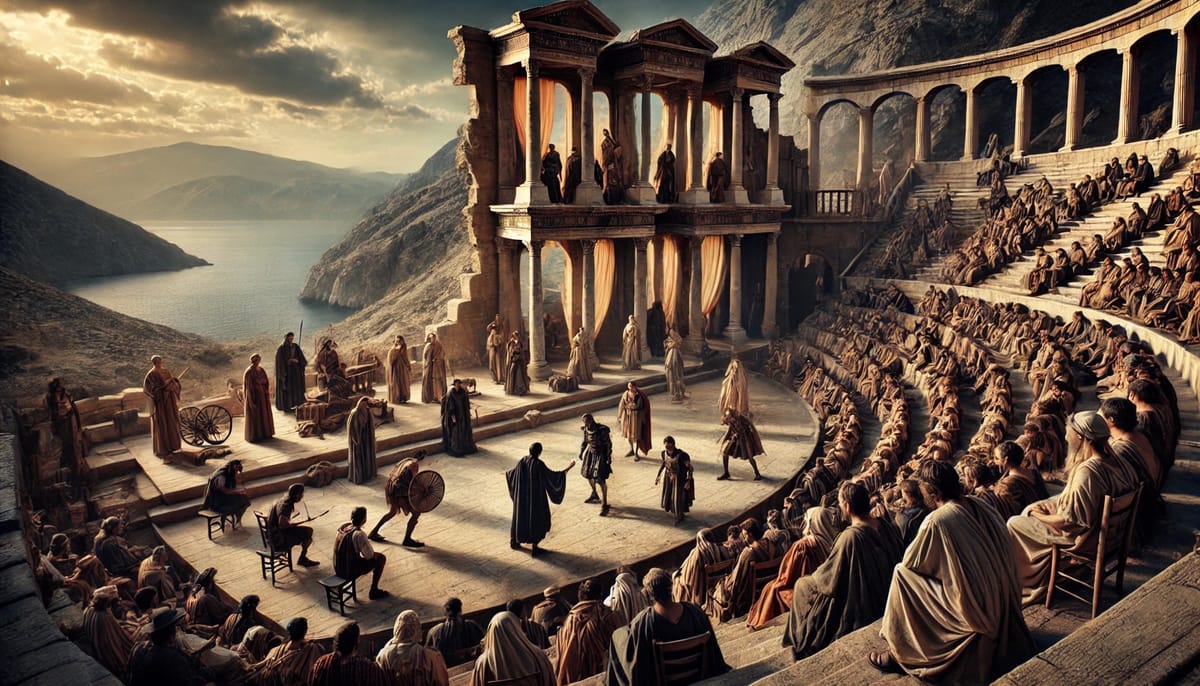Why Greek Tragedies still matter today: Timeless lessons in human nature
Greek tragedies may be centuries old, but they remain strikingly relevant today. Why? Because they offer something no modern blockbuster or neatly packaged series finale can: a raw, uncompromising look at human nature.

No Happy Endings: Why ancient plays still shock and move us centuries later
One of the reasons Greek tragedies are so timeless is that they don’t bother with happy endings. Life, as we all know, rarely ties up neatly, and neither do these plays. Whether it’s the blinding of Oedipus or the cycle of revenge in the Oresteia, these stories end not with resolution but with ambiguity and open-ended consequences. The audience is left to grapple with the messy, lingering aftermath, just as we often are in real life.
Dropping into chaos: The art of In Media Res
Greek playwrights loved to throw their audience right into the middle of the action — what's called in media res (fancy for “in the middle of things”). Forget long-winded backstories or lengthy introductions. By the time the curtain rises, things are already happening, and often, they're not looking good, teetering on the brink of disaster.
Take Sophocles' Oedipus Rex. The play doesn’t begin with Oedipus as a baby, abandoned and destined for tragedy. Instead, we meet him as the king of Thebes, facing a plague ravaging the city. People are dying, and Oedipus is frantically searching for answers. He’s already far along in his journey. As for the ending, Oedipus blinds himself in shame, leaving us with the brutal aftermath of his actions. There is no closure, just chaos.
Similarly, Aeschylus’ Agamemnon doesn’t start with the Trojan War or its origins. Instead, we’re thrust into the tense atmosphere of Agamemnon’s return home, where betrayal and revenge are simmering just beneath the surface. By the time we arrive, the characters are already in too deep, struggling to survive the storm. It’s a jarringly realistic portrayal of human fallibility.
Flaws on display: Nobody’s perfect, and that’s the point
Greek tragedies never shied away from showcasing deeply flawed, complex characters. They understood that perfection is an illusion and genuine engagement comes from seeing characters struggle with their contradictions.
In Euripides' Medea, we meet one of the most complex characters in literature. Medea is no helpless victim. When her husband Jason abandons her for another woman, her response is shocking — she murders their children. Her rage is horrifying, but at the same time, we understand it. Betrayal and humiliation fuel her terrifying actions, making her both relatable and terrifying.
In Sophocles' Antigone, the titular character defies King Creon to bury her brother, knowing it will cost her life. She’s brave and noble, yes, but also recklessly stubborn. Her devotion to family and divine law is admirable, but her refusal to compromise leads to tragedy. No one walks away victorious.
No true endings: Life Is messy, and so are Greek plays
Life doesn’t unfold neatly, and Greek tragedies reflect this messy reality. Rarely do these plays end with satisfying resolutions because life itself offers no such thing.
In Electra, Sophocles explores revenge, but the aftermath is far from celebratory. After Electra and Orestes avenge their father’s murder, there’s no sense of peace. Instead, the future feels uncertain, and the audience is left grappling with the long-term consequences of violence.
Aeschylus' Oresteia trilogy also ends without closure. While the cycle of vengeance appears broken, it leaves scars that won’t heal easily. Life continues, and so do the complexities of justice and retribution.
Why it works: Greek plays and real life
The enduring power of Greek tragedies lies in their refusal to sugarcoat life. Instead of offering neatly packaged endings or morally perfect heroes, they mirror the world as it truly is — chaotic, uncertain, and full of flawed people making difficult choices. These plays don’t hand us answers on a silver platter; instead, they challenge us to embrace the messiness of life. By doing so, they invite us to shift our ideology, to let go of the need for perfection and control, and perhaps, in the process, find a little more ease in accepting life as it is — imperfect but real.
So why do these ancient works still resonate today? Because they offer a slice of reality — an honest portrayal of the complexities of human nature, without the comforting illusion of a happy ending. In that way, they remain timeless, moving us with their stark truths and challenging us to face the unresolved questions in our own lives.
Fun fact: While the Greeks are famous for their tragedies, they also had a love for comedy. Playwright Aristophanes was known for his sharp wit and biting satire. After all, with all his tragic woes, even Oedipus could’ve used a laugh now and then, right?












